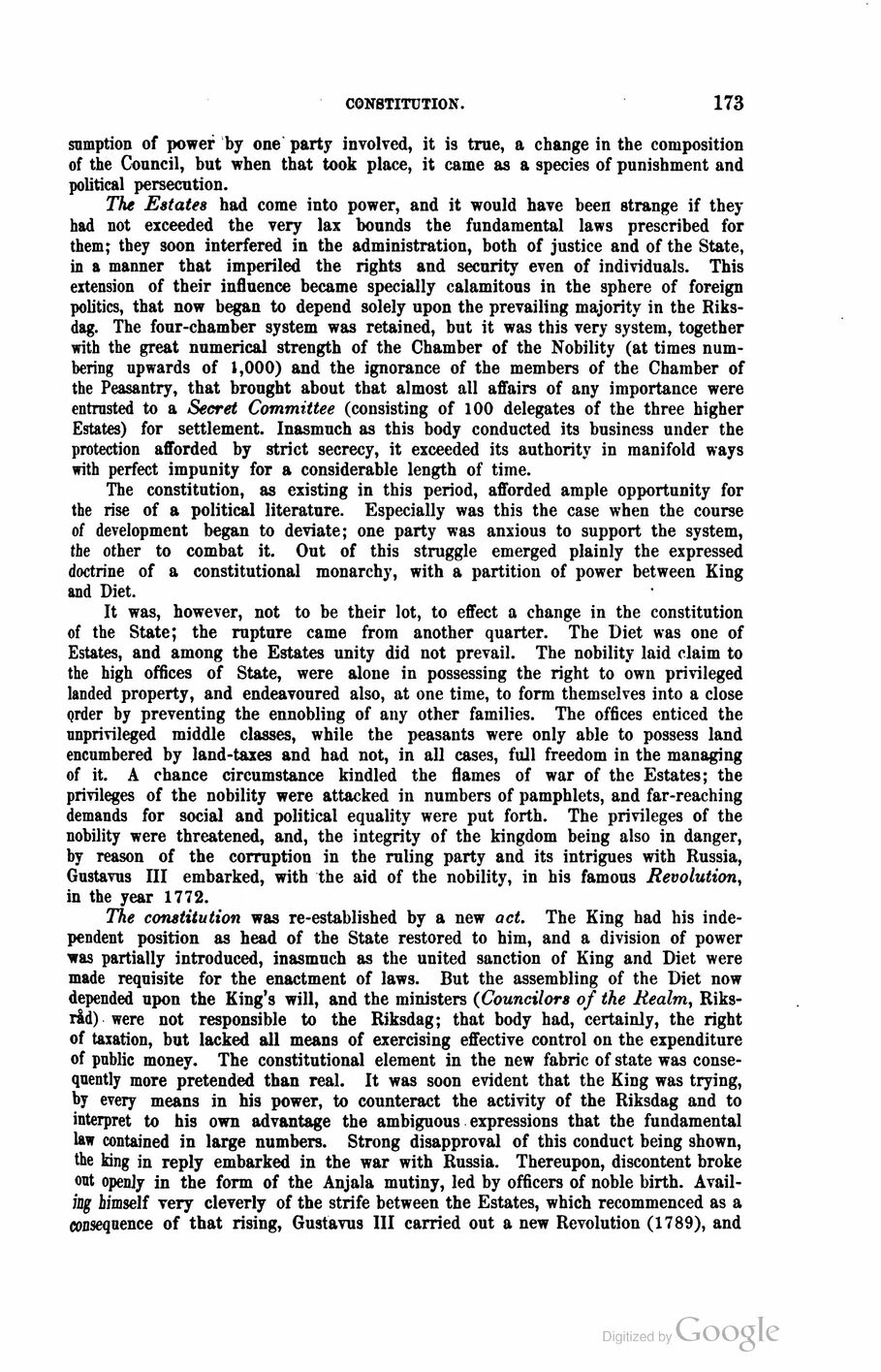
Full resolution (JPEG) - On this page / på denna sida - First part - III. Constitution and Administration - 1. Constitution - Historical Account and present Constitution, by E. Hildebrand, Ph. D., Chief of the National Record Office, Stockholm

<< prev. page << föreg. sida << >> nästa sida >> next page >>
Below is the raw OCR text
from the above scanned image.
Do you see an error? Proofread the page now!
Här nedan syns maskintolkade texten från faksimilbilden ovan.
Ser du något fel? Korrekturläs sidan nu!
This page has never been proofread. / Denna sida har aldrig korrekturlästs.
CONSTITUTION.
1<>9
sumption of power by one party involved, it is true, a change in the composition
of the Council, but when that took place, it came as a species of punishment and
political persecution.
The Estates had come into power, and it would have been strange if they
had not exceeded the very lax bounds the fundamental laws prescribed for
them; they soon interfered in the administration, both of justice and of the State,
in a manner that imperiled the rights and security even of individuals. This
eitension of their influence became specially calamitous in the sphere of foreign
politics, that now began to depend solely upon the prevailing majority in the
Riksdag. The four-chamber system was retained, but it was this very system, together
with the great numerical strength of the Chamber of the Nobility (at times
numbering upwards of 1,000) and the ignorance of the members of the Chamber of
the Peasantry, that brought about that almost all affairs of any importance were
entrusted to a Secret Committee (consisting of 100 delegates of the three higher
Estates) for settlement. Inasmuch as this body conducted its business under the
protection afforded by strict secrecy, it exceeded its authority in manifold ways
with perfect impunity for a considerable length of time.
The constitution, as existing in this period, afforded ample opportunity for
the rise of a political literature. Especially was this the case when the course
of development began to deviate; one party was anxious to support the system,
the other to combat it. Out of this struggle emerged plainly the expressed
doctrine of a constitutional monarchy, with a partition of power between King
and Diet.
It was, however, not to be their lot, to effect a change in the constitution
of the State; the rupture came from another quarter. The Diet was one of
Estates, and among the Estates unity did not prevail. The nobility laid claim to
the high offices of State, were alone in possessing the right to own privileged
landed property, and endeavoured also, at one time, to form themselves into a close
order by preventing the ennobling of any other families. The offices enticed the
unprivileged middle classes, while the peasants were only able to possess land
encumbered by land-taxes and had not, in all cases, full freedom in the managing
of it. A chance circumstance kindled the flames of war of the Estates; the
privileges of the nobility were attacked in numbers of pamphlets, and far-reaching
demands for social and political equality were put forth. The privileges of the
nobility were threatened, and, the integrity of the kingdom being also in danger,
by reason of the corruption in the ruling party and its intrigues with Russia,
Gustavus III embarked, with the aid of the nobility, in his famous Revolution,
in the year 1772.
The constitution was re-established by a new act. The King had his
independent position as head of the State restored to him, and a division of power
was partially introduced, inasmuch as the united sanction of King and Diet were
made requisite for the enactment of laws. But the assembling of the Diet now
depended upon the King’s will, and the ministers (Councilors of the Realm,
Riksråd) were not responsible to the Riksdag; that body had, certainly, the right
of taxation, but lacked all means of exercising effective control on the expenditure
of public money. The constitutional element in the new fabric of state was
consequently more pretended than real. It was soon evident that the King was trying,
by every means in his power, to counteract the activity of the Riksdag and to
interpret to his own advantage the ambiguous expressions that the fundamental
law contained in large numbers. Strong disapproval of this conduct being shown,
the king in reply embarked in the war with Russia. Thereupon, discontent broke
out openly in the form of the Anjala mutiny, led by officers of noble birth.
Availing iimself very cleverly of the strife between the Estates, which recommenced as a
consequence of that rising, Gustavus III carried out a new Revolution (1789), and
<< prev. page << föreg. sida << >> nästa sida >> next page >>